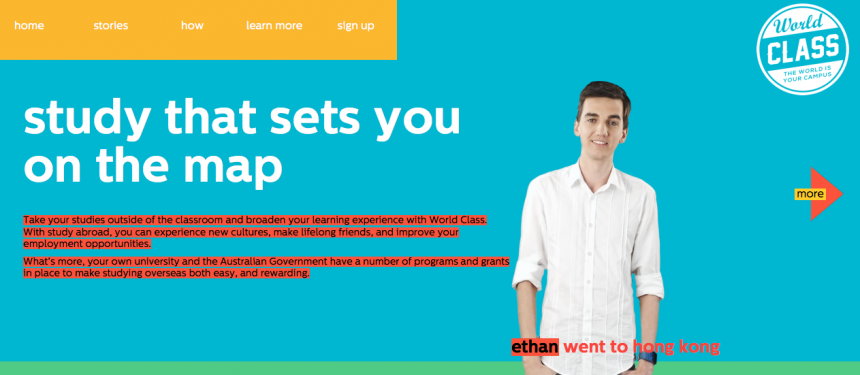Four Asian countries have officially signed on to take part in the pilot of Australia’s outbound mobility programme The New Colombo plan. The recently elected Liberal government has pledged AUD100 million over five years to the project that is set to commence in 2015 after the pilot phase runs through 2014.
News and business analysis for Professionals in International Education
Have some pie!
Australia preps for New Colombo plan, launches study abroad website

In further efforts to encourage Australian students to study overseas, the government and university sector launched the World Class website aimed at providing Australian students with information on student mobility programmes and available financial aid.
Figures from the Australian University International Directors Forum show that 24,763 students at all levels of higher education studied overseas in 2012, mostly in short-term and exchange programmes.
“The launch of the World Class microsite is a very welcome new means for promoting the value of overseas study, particularly in our neighbourhood, the Asia Pacific region,” said Brett Mason Parliamentary Secretary to the Minister for Foreign Affairs on Monday.
“The launch of the World Class microsite is a very welcome new means for promoting the value of overseas study”
While promoting all outbound mobility programmes offered through Australian universities, the site will also promote the study and internship programmes available through the New Colombo plan which aims to boost regional ties through student exchange.
Last week, Foreign Minister Julie Bishop solidified Hong Kong as the fourth partner for the scheme after Indonesia, Singapore and Japan had already accepted invitations to participate in the pilot phase.
“Australian students will benefit from the opportunity to study at Hong Kong’s world-class institutions and the ‘East Meets West’ culture,” said Bishop. “With thousands of Hong Kong students enrolled in Australian institutions each year, the New Colombo Plan will further enhance two-way student mobility through educational exchange.”
The government says other regional partnerships will be announced in 2015.
Introduced as part of the Liberal opposition’s campaign platform, the New Colombo plan is a revamped version of the Colombo Plan signed by the Australian government in the 1950’s to increase inbound mobility. The programme resulted in thousands of Asian students studying on scholarships at Australia’s top universities.
Under the authority of Australia’s Foreign Affairs Department, the New Colombo Plan aims to fund thousands of undergraduates to study and work in Asia through mentorships and internship programmes.
Phil Honeywood, CEO of the International Education Association of Australia (IEAA) and member of the New Colombo Plan steering committee says the new initiative could greatly impact diplomatic relations in the region.
“The real potential of the New Colombo Plan will be to promote study abroad to such a scale that , within one generation, it may well transform Australian students to have meaningful engagement with their fellow Asian students and thereby enhance our often vexed relations with the countries of our own region,” he told The PIE News.
“The New Colombo Plan may well transform Australian students to have meaningful engagement with their fellow Asian students”
Fortifying outbound mobility efforts is part of the new government’s pledge to prioritise international education. Education Minister Christopher Pyne took further action to comply with the government’s promise by directing the Tertiary Education Quality and Standards Agency to cut red tape.
In August, Australia’s peak bodies released a joint statement urging government to provide more support and lighter-touch regulation in order stop students turning to alternative study destinations.
Universities Australia estimates higher education institutions alone spend approximately $280 million a year on regulatory compliance and reporting.
Belinda Robinson, Chief Executive Universities Australia welcomed the minister’s attention to the issue saying a more efficient regulatory regime is required to “encourage rather than impede innovation and the ability for institutions to experiment with new business models in adapting to a more globally competitive environment and the opportunities created by digital technology.”
Still looking? Find by category:


